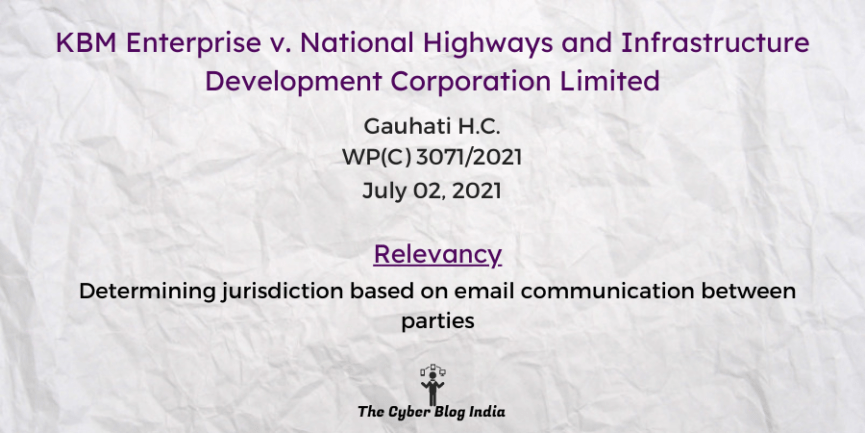KBM Enterprise v. National Highways and Infrastructure Development Corporation Limited

KBM Enterprise v. National Highways and Infrastructure Development Corporation Limited
In the High Court of Gauhati
WP(C) 3071/2021
Before Justice Kalyan Rai Surana
Decided on July 02, 2021
Relevancy of the case: Determining jurisdiction based on email communication between parties
Statutes and Provisions Involved
- The Information Technology Act, 2000 (Section 13)
- The Constitution of India, 1950 (Article 226)
- The Code of Civil Procedure, 1908 (Order XXIX, Rule 2)
Relevant Facts of the Case
- The petitioner was a successful bidder in the tendering process organised by the respondent. Subsequently, the respondent issued a Letter of Acceptance through its Executive Director through an email.
- Lockdown restrictions were in place due to the COVID-19 pandemic. Hence, the petitioner was unable to submit Performance Bank Guarantee before the Executive Director.
- Therefore, the Executive Director withdrew the Letter of Acceptance. The petitioner requested the Executive Director for an extension; however, he took action as per the Request for Proposal document and withdrew the Letter of Acceptance.
- The petitioner has filed this writ petition under Article 226 requesting to direct the respondent to consider the request of the petitioner made for an extension of time for submission of necessary requirements.
- Also, the petition questions the legality of the letter issued by the Executive Director rejecting the request made by the petitioner.
Prominent Argument of Advocates
- The petitioner claims that Section 13 of the Information Technology Act, 2000 deems the dispatch of an email to be complete once the electronic record enters the computer resource of the receiver. Hence, the receipt of the email should be the basis to consider the cause of action for the writ petition.
- The respondent’s counsel raised the issue of lack of territorial jurisdiction at Guwahati.
Opinion of the Bench
- The bench opined that Section 13 of the Information Technology Act, 2000 is misapplied because the receipt of an electronic record and any other correspondence exchanged would not create any cause of action for the petitioner.
- The bench observed that there is no proof to show that the place where the addressee receives the electronic record would be the place where the cause of action has arisen.
- Similar to Section 13(5) of the Information Technology Act, 2000, Order XXIX, Rule 2 of the Code of Civil Procedure, 1908 states that the principal place of business of a company is the location of its head office. Here, it is New Delhi.
- The cause of action for the petitioner lies in New Delhi.
Final Decision
- The bench returned the petition.
Gitanjali Sadan worked on an initial version of this draft. Julia Anna Joseph, an undergraduate student at Christ (Deemed to be University), provided further inputs during her internship with The Cyber Blog India in January/February 2022.
